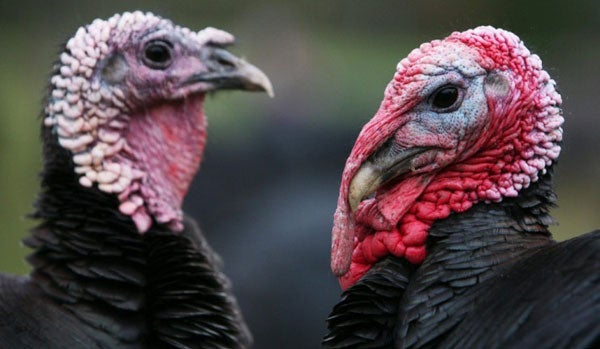Consuming Issues: The truth about British turkeys

Your support helps us to tell the story
From reproductive rights to climate change to Big Tech, The Independent is on the ground when the story is developing. Whether it's investigating the financials of Elon Musk's pro-Trump PAC or producing our latest documentary, 'The A Word', which shines a light on the American women fighting for reproductive rights, we know how important it is to parse out the facts from the messaging.
At such a critical moment in US history, we need reporters on the ground. Your donation allows us to keep sending journalists to speak to both sides of the story.
The Independent is trusted by Americans across the entire political spectrum. And unlike many other quality news outlets, we choose not to lock Americans out of our reporting and analysis with paywalls. We believe quality journalism should be available to everyone, paid for by those who can afford it.
Your support makes all the difference.Did you know that turkeys can fly? Not domesticated turkeys, of course, but wild turkeys, who fly for short distances at speeds of up to 55 miles per hour.
Just as well their shed-bred cousins can't flee, though shoppers seem to be fleeing from turkeys.
There seems to be a movement away from them this year. A London restaurant, High Timber, has decided not to serve turkey at Christmas. "I find it absolutely amazing that we reserve the worst meat for the most special meal of the year," spits co-owner Neleen Strauss.
A publicity stunt, perhaps, but some of the most famous chefs in Britain don't seem to like turkey much. Hugh Fearnley-Whittingstall says it goes too dry and resorts to hacking off the legs before shoving the breast in the oven. Heston Blumenthal won't be serving one at his family dinner; instead the Blumenthals will tuck into goose on 25 December. "It just goes too dry," the chef tutted in a newspaper interview.
Indeed, turkey seems to be falling out of public favour, probably not helped by 2007's outbreak of H5N1 avian flu in East Anglia. Some 160,000 turkeys had to be culled and, although a link with the Hungarian operation of Bernard Matthews was not proven, Matthews promised to sell only British birds in the UK in the future.
According to Mintel, sales of turkey have been slipping for years, with sales of 136 million tonnes in 2003 falling to an estimated 124 million last year. In cash terms, spending is down about 10 per cent over the same period after inflation to £136m a year.
Of course turkey is sold all year round, but the biggest splurge is at Christmas, with between 8 and 9 million turkeys stepping from slaughterhouse to dinner table.
What kind of a life do they have? Not a particularly good one, most of them. Little has been written about the treatment of these inquisitive birds, perhaps because they're thought of as seasonal, compared with the fuss rightly made about chickens last year.
Funnily enough – well, not funny, I suppose, if you're a flightless bird – conditions are very similar. It's the same old story, really.
Around 90 per cent of turkeys are kept in intensive sheds, up to 25,000 birds a time, with heavy use of lighting to keep them feeding almost round the clock. Fast-growing species are used. There's little stimulation. They eat, get bored, get excessively large upper bodies, get killed.
Compassion in World Farming is concerned about this and points out that there is no specific legislation governing turkeys, and the Government-backed code of conduct is voluntary. What does the RSPCA say? Much the same.
Alice Clark, the RSPCA farm animal welfare scientist, says: "We have real concerns about the way in which the majority of turkeys in the UK are raised. We would like to see all turkeys farmed to RSPCA standards where they are able to move around freely and perform their natural behaviours."
Sales are rising of the RSPCA's Freedom Food birds, which have twice the space, less constant lighting and more stimulation such as straw bales, perches and lengths of rope.
These birds cost more than Quality British Turkey. Even more expensive are free-range birds, which have a chance to peck around outside as well as enjoying more space.
Is it worth spending more? It depends if you care about animals. But I do wonder if people would be better off buying a smaller, better looked after bird and eating it all.
The internet is buzzing with recipes for turkey leftovers such as Christmas Pie. Sandwiches are not the only solution.
Too dry? Perhaps it's worth cooking the legs and breast separately.
Heroes & Villains
Heroes: Metropolitan Police
The Met have finally acted on the slew of scam websites selling fake branded goods. In an operation with Nominet, the internet authority, it closed down 1,219 dodgy websites. One of the main cons was advertising Ugg boots that were fake or simply never delivered. The sites will spring back, I'm sure, making the most of the time between starting and closing to defraud shoppers. But it's best to make life as hard as possible for the crooks.
Villains: Spanish eggs
Scores of people are falling ill with an unusual strain of salmonella and the chief suspect is Spanish eggs. Spanish eggs are cheaper, which is why they end up getting served up in care homes and takeaways. Several Chinese restaurants, a few other takeaways and a care home have all been investigated by the Health Protection Agency regarding the latest outbreak. In 2006, a survey by the European Food Safety Agency found 11 per cent of UK egg farms had salmonella. In Spain the figure was 73 per cent. Some 144 people in the UK have got salmonella in this latest outbreak. We should band Spanish eggs until the Spanish government cleans up the industry.
Join our commenting forum
Join thought-provoking conversations, follow other Independent readers and see their replies
Comments